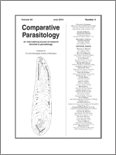
Comparative Parasitology
Scope & Guideline
Connecting Researchers Through Open Access Discoveries
Introduction
Aims and Scopes
- Ecological and Evolutionary Studies:
The journal focuses on the ecological dynamics and evolutionary relationships of parasites, examining how these organisms interact with their hosts and the environment. - Host-Parasite Interactions:
Research on host specificity, infection dynamics, and the effects of parasites on host populations is a core area, providing insights into the complexities of parasitic relationships. - Diversity and Taxonomy of Parasites:
The journal publishes studies that describe new species and provide taxonomic revisions, contributing to the broader understanding of parasitic biodiversity. - Methodological Innovations:
*Comparative Parasitology* encourages the development and application of new methodologies for studying parasites, including molecular techniques and ecological modeling. - Zoonotic and Veterinary Parasitology:
Research addressing zoonotic parasites and their implications for veterinary science is emphasized, reflecting the journal's commitment to applied parasitology.
Trending and Emerging
- Molecular and Genetic Studies:
There is an increasing emphasis on molecular techniques for identifying and characterizing parasites, which enhances understanding of host-parasite dynamics at a genetic level. - Impact of Climate Change on Parasitism:
Research exploring the effects of climate change on parasite life cycles and host interactions is gaining traction, highlighting the ecological implications of global environmental changes. - Conservation Parasitology:
The journal is seeing a rise in studies linking parasitism to conservation efforts, particularly in threatened species, emphasizing the role of parasites in ecosystem health. - Probiotics and Parasite Interactions:
Emerging research on the role of probiotics in managing parasite infections in hosts, particularly in agricultural settings, reflects a growing interest in applied parasitology. - Urban and Anthropogenic Effects on Parasite Dynamics:
Studies examining how urbanization and human activity influence parasite prevalence and diversity are becoming more common, indicating a shift towards understanding human-wildlife interactions.
Declining or Waning
- Studies on Ectoparasites:
Research focusing specifically on ectoparasites, such as fleas and ticks, has seen a decrease, suggesting a shift towards endoparasitic studies or other ecological interactions. - General Helminth Surveys:
While surveys of helminth parasites continue, general studies that do not offer new insights or novel methodologies are appearing less frequently, indicating a possible preference for more targeted research. - Host Phylogeny Studies:
There has been a reduction in publications solely focused on the phylogenetic aspects of host-parasite interactions, as researchers may be prioritizing ecological and environmental impacts over purely phylogenetic analyses.
Similar Journals

Bangladesh Journal of Plant Taxonomy
Championing open access to plant biodiversity insights.Welcome to the Bangladesh Journal of Plant Taxonomy, a leading open-access publication dedicated to advancing the understanding of plant taxonomy in the context of Bangladesh's rich biodiversity. Published by the Bangladesh Association of Plant Taxonomists, this journal plays a crucial role in fostering academic discourse and dissemination of research findings since its establishment. With its ISSN 1028-2092 and E-ISSN 2224-7297, the journal provides a platform for researchers, professionals, and students to share their contributions to plant science. Although it has discontinued its coverage in Scopus from 2018, it remains a valuable resource, evidenced by its rankings in the agricultural and biological sciences categories, including a placement of #330/403 in Plant Science and #515/588 in Ecology, Evolution, Behavior, and Systematics. Open access since 2005, the journal ensures that critical research is freely available to all, supporting the global community in the study and preservation of plant biodiversity.
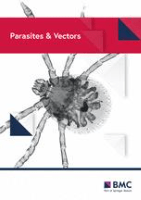
Parasites & Vectors
Leading the charge in parasitology and vector research.Parasites & Vectors is a leading open access journal dedicated to the dissemination of high-quality research on the vectors of infectious diseases and their parasitic agents. Published by BMC in the United Kingdom, this journal has been at the forefront of its field since its establishment in 2008, contributing to our understanding of vector-borne pathogens through its rigorous peer-reviewed articles. With a notable impact factor and categorized in the top quartile (Q1) in both Infectious Diseases and Parasitology, it is an essential resource for researchers, professionals, and students worldwide. The journal ranks impressively within various categories, holding a position of 7th out of 194 in Veterinary General Veterinary and 12th out of 79 in Immunology and Microbiology Parasitology, indicating its significant contribution to the sciences. Accessible to all, Parasites & Vectors supports the global pursuit of knowledge in epidemiology and disease control, making it an indispensable platform for sharing innovative findings and fostering collaboration within the scientific community.

JOURNAL OF HELMINTHOLOGY
Exploring the complexities of parasitology.JOURNAL OF HELMINTHOLOGY, published by Cambridge University Press, has been a pioneering platform for the dissemination of research in the field of helminthology since its inception in 1923. With a notable focus on animal science and parasitology, this journal holds a distinguished position in the academic landscape, attaining Q2 status in Animal Science and Zoology and Q3 in both Medicine (miscellaneous) and Parasitology as of 2023. The journal aims to advance the understanding of helminth parasites, their epidemiology, and the myriad implications for human and animal health. Access to this esteemed journal is currently non-open, enabling a curated and high-quality review process that enhances the academic rigor seen in its publications. Residing in the United Kingdom, the JOURNAL OF HELMINTHOLOGY serves as a vital resource for researchers, professionals, and students alike, fostering a community dedicated to combating the challenges posed by helminth infections globally. With its rich history and commitment to excellence, the journal continues to contribute significantly to the fields of parasitology and beyond.
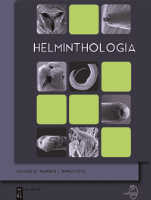
HELMINTHOLOGIA
Bridging Knowledge Gaps in Parasitology and ZoologyHELMINTHOLOGIA is a distinguished open-access journal published by SCIENDO, dedicated to advancing our understanding of parasitology and its relationship with animal science. Since its establishment in 1979, this journal has been a vital resource for researchers, professionals, and students in the fields of Animal Science and Zoology as well as Parasitology, featuring comprehensive research articles that span a diverse array of topics pertaining to helminths and their impact on host organisms. With an impressive impact factor and a commendable ranking in both Scopus categories (Rank #275 in Animal Science and Zoology and Rank #55 in Parasitology), it serves as a crucial platform for disseminating knowledge that informs both academic inquiry and practical application. Operating out of Poland, HELMINTHOLOGIA has embraced an open-access model since 2006, ensuring that its content is readily available to a global audience, thereby fostering collaboration and innovation in parasitic research.

PARASITOLOGY RESEARCH
Advancing the frontiers of parasitology research.PARASITOLOGY RESEARCH, published by Springer, stands as a pivotal journal in the fields of parasitology, infectious diseases, and insect science, with a rich history dating back to 1987. Operating from Germany, this journal has garnered an impressive reputation, achieving a high ranking within various categories, including Q1 in Veterinary (miscellaneous) and Q2 across several relevant fields as of 2023. While it does not currently offer Open Access options, the journal remains a vital resource for researchers, professionals, and students seeking to contribute to and keep pace with advancements in parasitological studies. With a commitment to publishing high-quality research, PARASITOLOGY RESEARCH serves as an essential forum for disseminating findings that enhance our understanding of parasitic organisms and their impacts on health and the environment. Explore this journal to engage with cutting-edge investigations and reviews that drive innovation in parasitology and related disciplines.
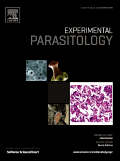
EXPERIMENTAL PARASITOLOGY
Elevating the Study of Parasites and Their Impact on HealthEXPERIMENTAL PARASITOLOGY, published by Academic Press Inc Elsevier Science, is a prominent journal in the domains of immunology, infectious diseases, and parasitology, with roots extending back to 1951. This journal, bearing the ISSN 0014-4894 and E-ISSN 1090-2449, serves as a critical conduit for sharing advancements in the understanding of parasite biology, host-parasite interactions, and the immunological responses elicited by parasitic infections. Although it currently operates under a subscription model without open access options, its rigorous scholarly content is vital for researchers and practitioners alike looking to stay informed on the latest developments and applications in the field. With a recent categorization as Q3 in key scientific categories, including Infectious Diseases and Parasitology, and a Scopus ranking solidifying its relevance, EXPERIMENTAL PARASITOLOGY is an essential resource for those committed to advancing knowledge and solutions to parasitic diseases.

Parasitologists United Journal
Unveiling Innovations in Parasitic ResearchParasitologists United Journal is a premier academic outlet dedicated to advancing the field of parasitology. Published by the Egyptian Parasitologists United Society (EPU), this journal serves as a critical platform for researchers, professionals, and students alike, allowing them to share innovative findings and developments in the study of parasites and their impacts on human, animal, and environmental health. With an ISSN of 1687-7942 and an E-ISSN of 2090-2646, it aims to promote knowledge dissemination while fostering collaboration across borders. Although currently not an Open Access journal, its commitment to high-quality, peer-reviewed content ensures that the latest research reaches discerning readers. By featuring a diverse array of articles spanning various aspects of parasitology, the journal significantly contributes to the global understanding of parasitic diseases and their management, making it an essential resource for academic and clinical professionals seeking to enhance their expertise in this vital area of health science.

Parasite
Fostering innovation in parasitology through open-access research.Parasite is a distinguished open-access journal published by EDP Sciences S A based in France, specializing in the multifaceted field of parasitology and related disciplines. Since its inception in 1994, it has played a pivotal role in advancing research in Agricultural and Biological Sciences, Animal Science and Zoology, Infectious Diseases, Insect Science, and Veterinary Sciences, earning a prominent place in the academic community with its 2023 rankings placing it in the Q1 category for several key areas. With an impact factor reflective of its quality and engagement, the journal fosters a collaborative environment for researchers, professionals, and students to disseminate and access high-quality studies and reviews. Operating under an open-access policy since 2013, Parasite ensures that cutting-edge research is accessible to a global audience, thereby promoting knowledge sharing and innovation in the field. For more information, please visit the journal's homepage and explore its extensive repository of articles that contribute to the understanding of parasitic interactions and their implications in health and agriculture.
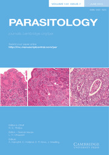
PARASITOLOGY
Advancing the frontiers of parasitic research.PARASITOLOGY, published by Cambridge University Press, is a prestigious journal that has been at the forefront of research in the field of parasitology since its inception in 1908. This esteemed publication carries the ISSN 0031-1820 and E-ISSN 1469-8161, and its rigorous peer-reviewed articles provide insights into both fundamental and applied aspects of parasitic biology, infectious diseases, and host-parasite interactions. With a commendable impact factor, PARASITOLOGY ranks in the top quartile (Q1) for Animal Science and Zoology and holds Q2 rankings in both Infectious Diseases and Parasitology categories, indicating its significant influence and contribution to these disciplines. The journal's diverse scope allows for a broad range of research articles, reviews, and case studies, making it an essential resource for researchers, professionals, and students seeking to stay updated on the latest developments in the field. Based in the United Kingdom, PARASITOLOGY offers valuable access to critical research in an era where understanding parasitic diseases is more vital than ever, and continues to shape the future of this important scientific field.
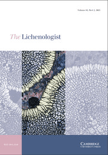
LICHENOLOGIST
Illuminating the Hidden Life of LichensLICHENOLOGIST is a prestigious journal published by Cambridge University Press, dedicated to advancing the field of lichenology and promoting a deeper understanding of the ecology, evolution, and systematics of lichens. Established in 1958 and focusing on the convergence of research through 2024, this journal has established itself as a significant resource within the Q2 category of Ecology, Evolution, Behavior and Systematics. With a Scopus ranking of #316 out of 721 in its field, it highlights research that not only enhances academic knowledge but also has practical implications for ecology and conservation efforts globally. Although traditionally not an open-access journal, it provides valuable insights and contributes to the scientific community by disseminating high-quality, peer-reviewed research. LICHENOLOGIST is essential for researchers, professionals, and students looking to stay informed about the latest advancements in lichen studies, making it an indispensable resource for anyone involved in ecological and biological sciences.